January 20, 2023
Air Date: January 20, 2023
FULL SHOW
SEGMENTS
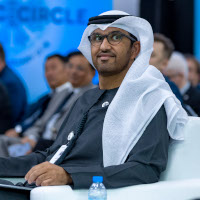
Controversial Oil CEO to Lead UN Climate Treaty
View the page for this story
Activists are expressing outrage in the wake of the decision by the United Arab Emirates to appoint oil executive Sultan al-Jaber as President of this year’s UN climate treaty negotiations at COP28 in Dubai. Mithika Mwenda, executive director of the Pan African Climate Justice Alliance and May Boeve, executive director of 350.org, join Host Steve Curwood to explain the concerns and discuss how fossil fuel interests are deflecting progress in the treaty process. (10:25)
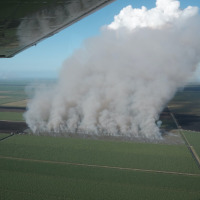
Burning Sugarcane Pollutes Communities of Color
/ Sandy TolanView the page for this story
Some Florida sugarcane growers near the Everglades still use the archaic method of burning fields to remove the tops and leaves before harvesting the sweet cane stalks. Nearby residents say the smoke and ash promote adverse health effects. As reporter Sandy Tolan explains, communities of color nearby assert they bear a disproportionate burden of adverse health effects from the resulting smoke and ash pollution. (21:39)

Beyond The Headlines
/ Peter DykstraView the page for this story
Journalist Peter Dykstra joins Host Steve Curwood this week to discuss a proposal to phase out gas cooking stoves linked to health risks. and They also consider the climate rhetoric of the new Republican Chair of the US House Science, Space and Technology Committee. And in history they look back to President Nixon’s 1970 State of the Union address with its soaring language about protecting the environment. (04:33)
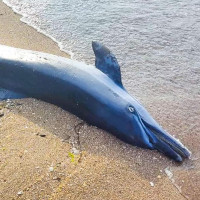
Marine Mammal Casualties of Russia’s War
View the page for this story
In addition to the devastating human toll of Russia’s war on Ukraine, marine scientists have documented recent mass strandings of dolphins and porpoises in the Black Sea. A key suspect is military sonar, which can disorient cetaceans that use sound to navigate. Alix Kroeger, a freelance journalist from the UK, spoke with researchers in the region about the impacts of war on marine mammals and joins Host Bobby Bascomb to explain. (08:33)
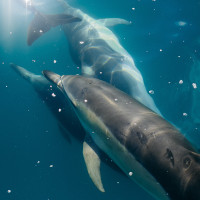
Listening on Earth: Dolphins Talk
View the page for this story
Bottlenose dolphins can use clicking noises for echolocation and navigation, and they speak to each other using special whistles. Wild Quest recorded these dolphin noises in the Bahamas. (01:10)
Show Credits and Funders
Show Transcript
230120 Transcript
HOSTS: Bobby Bascomb, Steve Curwood
GUESTS: May Boeve, Alix Kroeger, Mithika Mwenda
REPORTERS: Peter Dykstra, Sandy Tolan
[THEME]
CURWOOD: From PRX – this is Living On Earth.
[THEME]
CURWOOD: I’m Steve Curwood.
BASCOMB: And I’m Bobby Bascomb
The United Arab Emirates appoints the head of an oil company to preside over the 2023 UN climate treaty summit.
BOEVE: If this isn’t a bridge too far, appointing an oil executive to this post then what is? We have to be able to vociferously call out these egregious decisions for the embarrassments that they are.
CURWOOD: Also, some communities of color disproportionally suffer air pollution from sugar cane harvest burning.
WALKES: The ash, affectionately known as the black snow. Ash is just raining down upon everything in the community. Your homes, your cars, your food. It’s almost apocalyptic at times, especially when fields are being burnt simultaneously. You know the smoke can block the sun out. The community actually turns dark. It's like, wow, man, this is this is crazy.
CURWOOD: That and more this week on Living on Earth – Stick Around!
[NEWSBREAK MUSIC: Boards Of Canada “Zoetrope” from “In A Beautiful Place Out In The Country” (Warp Records 2000)]
[THEME]
Controversial Oil CEO to Lead UN Climate Treaty
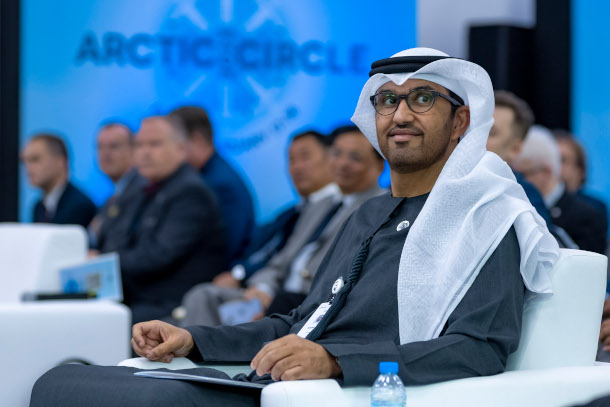
Oil company CEO Sultan al Jaber was appointed president of COP 28 by the UAE. (Photo: Arctic Circle, Flickr, CC BY 2.0)
CURWOOD: From PRX and the Jennifer and Ted Stanley Studios at the University of Massachusetts Boston, this is Living on Earth. I’m Steve Curwood.
BASCOMB: And I’m Bobby Bascomb.
There is outrage over the decision of the United Arab Emirates to have the head of Abu Dhabi National Oil Company preside over the COP28 climate treaty summit this fall in Dubai. Critics say it is a blatant conflict of interest to have oil CEO Sultan al-Jaber lead the UN climate talks which has the mission to transition the world away from the very resource that makes his company wealthy. There have been outcries around the world demanding a replacement.
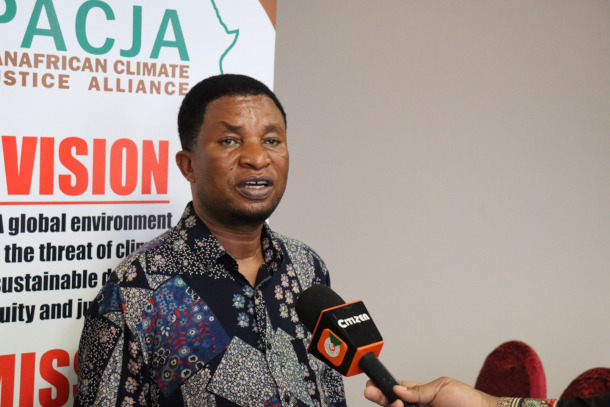
Mithika Mwenda is the co-founder and Executive Director of the Pan African Climate Justice Alliance. (Photo: Courtesy of the Pan African Climate Justice Alliance)
CURWOOD: Yes, I reached Mithika Mwenda, the Executive Director of the Pan African Climate Justice Alliance, based in Nairobi and asked his opinion:
MWENDA: I was really, really shocked.
CURWOOD: To what extent does it feel like, if Sultan Al-Jaber is the President of the COP, that it’s like “the fox guarding the henhouse?”
MWENDA: That is it. It’s, it’s like putting a hyena in the same place with the sheep. We would urge the UAE government to really listen to the cries of the people: women in the Congo forest; Indigenous people in Africa; smallholder farmers whose crops are withered away because there is no rainfall and the thousands of people in the Horn of Africa who are facing starvation as a result of the changing climate. We may not have the power of money, but the power of the people will prevail. The United States is thinking that addressing climate change is like charity to Africa. It is not, because this is not going to be an isolated problem for Africa. It is going to be only that it is coming gradually, and incrementally, because when we are going to sink in this global titanic, all of us are going to perish, though we are going to perish at different times.
CURWOOD: May Boeve the Executive Director of 350.org is on the line now from California, hi there May!
BOEVE: Great to be here, Steve.
CURWOOD: So what was your reaction when you heard that Sultan Al Jaber had been appointed President of COP 28?
BOEVE: I was angry. It's like appointing the head of Smirnoff to an Alcoholics Anonymous meeting. [LAUGHS] Who are we kidding here, you know? This really risks the legitimacy of these meetings in the eyes of the public, because we're on the verge of this massive energy transition around the world. And so to appoint someone who embodies the status quo–what we're trying to move away from–it just doesn't make any sense.
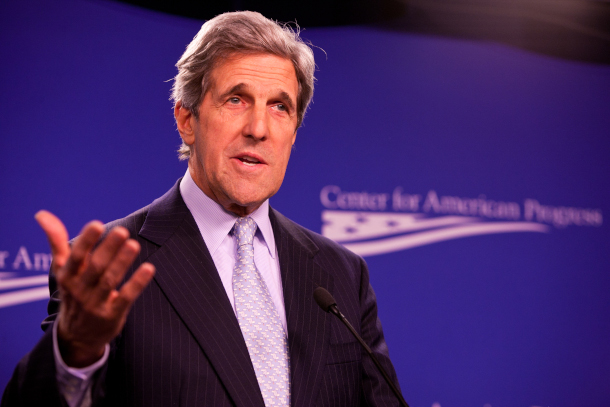
Former US Secretary of State and Senator John Kerry, President Biden’s international climate envoy, came out in support of al Jaber leading COP 28. (Photo: Center for American Progress, Flickr, CC BY-ND 2.0)
CURWOOD: Now remind us of what the responsibility the President of the COP has during the climate negotiations. What's the role that he or she plays?
BOEVE: So the COP President is the most important governing role at the COP, responsible for setting agendas, and this person also helps set the tone internationally. And that's also really important because the two weeks of the COP are a moment when the global media spotlight is on the topic of climate change. And so our ability as social movements to tell the story of how we are fighting the climate crisis, so much of that happens around the COP. There are often mass marches and protests and actions that really help bring movements together, to remind us everything that we have at stake and the urgency of the fight. And so that tone setting role of the Presidency matters a tremendous amount with so much at stake. And so that's another reason that we're deeply concerned about this appointment.
CURWOOD: Now, of course, the fossil fuel industry has been present at the UN climate treaty meetings before. In fact, at each of the last two COPs more than 500 fossil fuel lobbyists were present. And even going back to Kyoto, Maurice Strong, who chaired kind of the special committee to get things done there -- yes, he was a former undersecretary of the United Nations, but he also was a former oil man from Canada. So, it's not as if the fossil fuel industry has never been involved here. Why is this different?
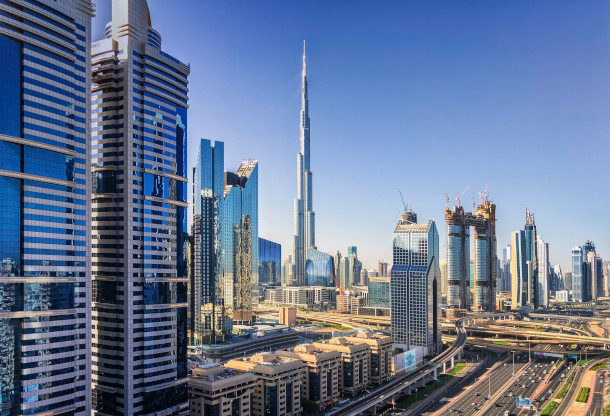
The UAE will host COP 28 in Dubai. (Photo: Kent Tupas on Unsplash)
BOEVE: Well, let's be clear. There are a lot of records that are being broken when it comes to climate change. And we're most familiar with the records around extreme heat and weather disasters. But we're also breaking records for fossil fuel lobbyist influence in this process. So, I was at COP 27 in Egypt; a record breaking amount of lobbyists were present. And you see them everywhere. They're not even hiding. They're, they're in plain sight, making deals. And last year in Egypt, there were some important decisions taken, particularly for the most vulnerable countries in the world. And at this COP, there are some crucial decisions that have to be made to follow up from those decisions last year. And so, if we run the risk of stepping back from where we were, we have a real problem on our hands. And we can't let that happen.
CURWOOD: By the way, there's a fair amount of grumbling from last year's COP that did create this loss and damage fund. But so far there hasn't been a dime put in it.
BOEVE: Exactly. And those are the types of decisions that are taken at subsequent years' COPs. I think that the decision to establish the loss and damage facility, that was a really important thing that happened last year. So, we celebrate this, and we have to keep the momentum going.
CURWOOD: Now, John Kerry, President Biden's international climate envoy, came out in support of Sultan Al Jaber to be president of this COP. What do you make of his support?

Sultan Ahmed al Jaber’s role in the upcoming COP is drawing criticism from environmental groups. (Photo: ABLF, Flickr, CC BY-NC-ND 2.0)
BOEVE: I wonder if it's just a diplomatic gesture, because there's a lot of that at these conferences. There's a lot of countries not wanting to criticize one another. There's a lot of patting each other on the back that happens in these settings. And in this country, where the US finally joined the party and put meaningful national legislation on the table in advance of a COP, we've been waiting decades for this moment, it finally happened. The rest of the world looks at the US like, okay, too little too late people, but we're glad you're here. The US has to take its global role seriously. And so, this welcoming of the appointment is eyebrow raising, to say the least. If this isn't a bridge too far, appointing an oil executive to this post, then what is? And we have to be able to vociferously call out these egregious decisions for the embarrassments that they are. And I think people deserve better than diplomatic niceties at this late stage of the climate crisis.
CURWOOD: Now, what kind of action or reaction to this appointment do you think is likely? I mean, what about boycotts? What about a walkout? Wouldn't be the first time that this would happen. But how could a major walkout impact COP 28?
BOEVE: It would be significant and different. I've been part of previous walkouts of previous COPs that usually happen because something unforgivable has happened in the process. And we all collectively decide to stand with the countries who are saying enough is enough. So there is precedent for this. And there is discussion about whether this decision is an example where we just cannot stand by and let this happen and attend and give it legitimacy with our presence. The thing to keep in mind, which is the other side of that coin, is that this is the one time when every country is present, every country has a voice, small countries, large countries, everybody's there, and for a lot of the activists that we work with, this is a rare chance to be present with delegates from your country who are fighting climate change. And in the US we are so accustomed to often an antagonistic relationship with government and activists over climate. In a lot of parts of the world that's not true. There's actually a lot of collaboration and solidarity between particularly the most impacted countries. And so missing a COP is a really hard decision in those settings. And so much of the climate crisis, as we know, is about equity. It's about who's affected. It's about whose solutions are listened to, it's about who suffers and who doesn't, and to what degree. In a forum like this one with the UN, there is a tremendous amount of space at the table for everyone. And that matters quite a lot.
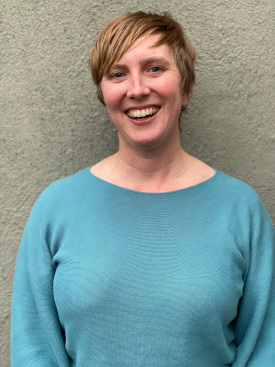
May Boeve is the Executive Director of 350.org. (Photo: Courtesy of 350.org)
CURWOOD: May, to what extent is this UN process, this Conference of the Parties of the United Nations Framework on Climate Change treaty, to what extent is this even working some 30 years on with the climate emergency advancing so quickly? You're in California, I don't have to tell you about the crazy weather you have there and around the rest of the world.
BOEVE: The way I think about the annual UN climate talks is that for a problem as big as climate change, and as global as climate change, there has to be a way for every country to work together on solutions. There's no way to envision the scale of action we need without a process hosted by the United Nations. And it can't be the only game in town. We need every possible mechanism to address this problem. And that's why I'm so glad that there are multiple venues where people are problem solving about climate change, whether it's forums of mayors that are convened every year by C40, whether it's forums of activists that my colleagues at 350 and many other groups are part of convening, whether it's state officials, and even librarians and athletes now have fora to discuss how to fight climate change. So, we all have to be involved, but there is no substitute for an intergovernmental process at the UN. And for all of its flaws, we have to make it better. And that's why we have to speak up when decisions are taken like this appointment of Al Jaber, we have to raise our voices and say this is not okay because this process means something to us and it means a lot more to people who are the most affected by climate change.
CURWOOD: May Boeve is the executive director of the group 350.org. Thanks so much for taking the time with us today, May.
BOEVE: My pleasure.
Related links:
- Associated Press | "African Activists Cast Doubt Over Climate Talks' Credibility"
- Associated Press | "John Kerry Tells AP He Backs UAE Oil Chief Overseeing COP28"
- Read the Pan African Climate Justice Alliance statement about Sultan al-Jaber's appointment
- Upstream | “Adnoc Chief’s Role in COP28 Summit Sparks Backlash”
- KBC Channel 1 | “COP 28 Politics: Consortium Dismisses Appointment of Oil Executive”
- The Guardian | “Let’s face reality. Fossil fuel interests have destroyed the COPs – we need something new”
- Read more about 350’s work here
[MUSIC: Ali Farka Toure & Toumani Diabate, “Be Mankan” on Ali and Toumani, by Ali Farka Toure & Toumani Diabate, Nonesuch Records]
BASCOMB: Coming up – The fight for clean air in communities of color downwind from the ash and smoke from the sugar cane burning in Florida. That’s just ahead on Living on Earth.
ANNOUNCER: Support for Living on Earth comes from Sailors for the Sea and Oceana. Helping boaters race clean, sail green and protect the seas they love. More information @sailorsforthesea.org. Support also comes from Friends of Smeagull the Seagull and Smeagull’s Guide to Wildlife. It’s all about the wildlife right next door to you! That’s Smeagull, S - M - E - A - G - U - L - L, SmeagullGuide.org.
[CUTAWAY MUSIC: The Gypsy Kings, “Moorea” on The Best Of the Gypsy Kings, by Gypsy Kings, Nonesuch Records]
Burning Sugarcane Pollutes Communities of Color
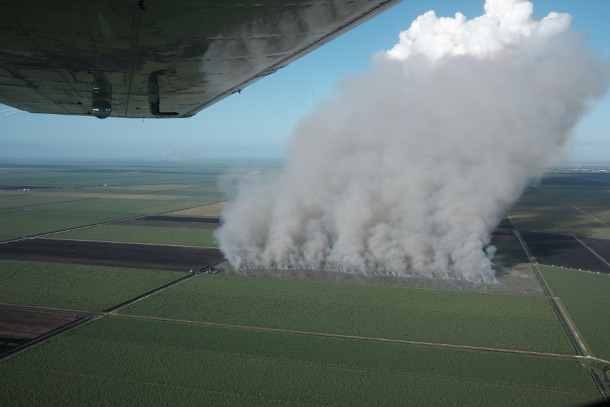
Sugarcane fields are routinely burned to incinerate leaf litter before harvest. (Photo: Courtesy of Jose Jesus Zaragoza)
BASCOMB: It’s Living on Earth, I’m Bobby Bascomb.
CURWOOD: And I’m Steve Curwood.
Sugar cane is a perennial grass that can be harvested as many as five times before being replanted, and for centuries growers would set fields on fire to burn off the tops and leaves before harvesting the sweet canes stalks. Many modern sugar growers use mechanical harvesters to strip away those tops and leaves rather than pollute the air with ash and particulates from burning. But burning still persists in Palm Beach County Florida, where, with support from the Pulitzer Center, reporter Sandy Tolan found this cheap old-fashioned method is imposing disproportionately high health costs on nearby communities of color.
VOICE 1: Maintain a traffic white highway departing 110.
[PLANE AUDIO SFX]
TOLAN: The single engine Cessna flies low, its shadow flitting along the edge of the Everglades. Decades ago, hundreds of square miles were dug, drained, and scraped, then the rich muck planted in sugarcane.
HARTMAN: So, what we're passing is called the Everglades Agricultural Area.
TOLAN: The Atlantic Ocean sparkles in the east. Just along the shore, the mansions of the sugar barons of Palm Beach.
[TRAFFIC CHATTER SFX]
TOLAN: At a thousand feet, we look down on the source of that wealth: half a million acres of sugarcane. Most of that sea of monoculture belongs to U.S. Sugar, and to Florida Crystals, part of the Fanjul sugar empire.
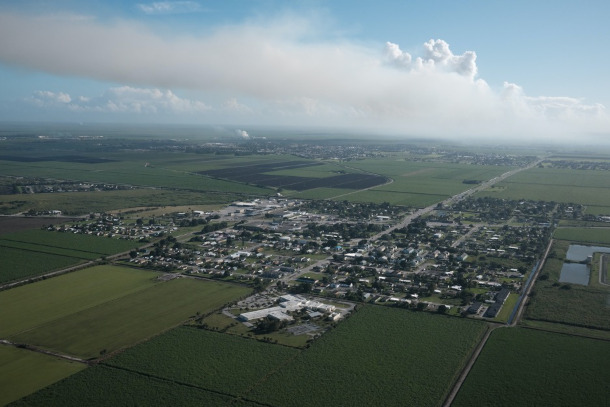
Muck City residents report that ash from sugarcane burns is a constant nuisance and negatively impacts their health. (Photo: Courtesy of Jose Jesus Zaragoza)
[TRAFFIC CHATTER SFX]
TOLAN: Our plane banks to the west. We can see Muck City - the nickname for the largely black towns of Belle Glade, Pahokee, and South Bay. Also known as the Glades.
HARTMAN: I believe that is Belle Glade.
TOLAN: Allie Hartman is with Friends of the Everglades - part of a coalition of environmentalists and local Glades residents fighting the pre-harvest burns.
HARTMAN: Yeah. So, on the left side of the plane here, we're seeing a massive sugarcane burn that starts along that crop line there. And it will continue burning until that entire field has been burned. What it does is it removes what they would call the trash material until only the sugarcane stalk is left. It's a cheaper method for harvest.
TOLAN: Cheaper, and dirtier. How dirty?
[BURNING SFX]
TOLAN: To understand that, I get back on the ground, ride down a washboard cane road, and stop my rental car in front of the flames.
[CAR SFX, BURNING SFX]
TOLAN: It's getting really hot!
TOLAN: From the fire comes smoke; from the smoke: ash. Tons, and tons of ash. The people of Muck City told me about it.
VOICE 2: The ash, unaffectionately known as the black snow. Ash is just raining down upon everything in the community. Your homes, your cars, your food...
VOICE 3: It's like black ash all over the place. It's like raining ash.
VOICE 4: Out of nowhere, you know, you're just sitting there, boom! Ash is on you, you look at your clothes, hey, I got ash on my clothes.
VOICE 5: It messed up our cars and messed up our houses. It messed up our hair. I have natural hair, and when it gets in there, it's really hard to get out.
VOICE 6: Stay inside, keep your windows down or whatever.
VOICE 7: As much as I can try to keep him indoors and say, son, we can't go outside. He's a boy. You know, he wants to run and climb the trees.
VOICE 8: I'm sitting out trying to enjoy a drink. You know, my drink has ash in it and I have to do something about this.
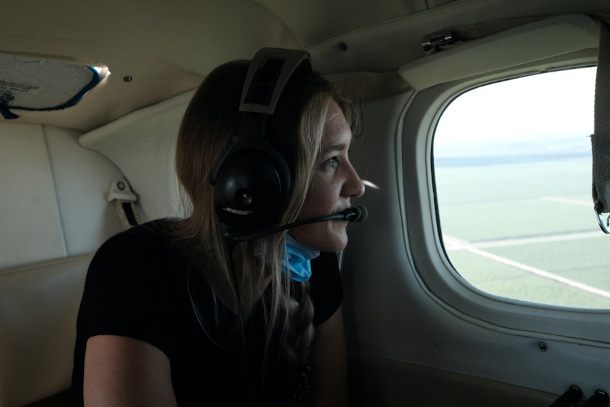
Allie Hartman, Communications Director at Friends of the Everglades, looks out the window at sugarcane fields burning. (Photo: Courtesy of Jose Jesus Zaragoza)
VOICE 9: You would think, like, where is this coming from? Why is it like this?
VOICE 10: It's like it's almost apocalyptic at times, especially when fields are being burnt simultaneously. You know the smoke can block the sun out... the community actually turns dark. It's like, wow, man, this is this is crazy.
TOLAN: It would be crazy just about anywhere else. But the three towns that make up Muck City are company towns. Florida Crystals and U.S. Sugar sponsor little leagues, scholarship programs. They helped pay for a couple of local parks and a community center. But all that comes with a message: don't mess with the burns. Just live with the ash.
PHILLIPS: You know, we felt like, okay, this is just normal. this is what we've been seeing all our life.
TOLAN: This is community activist Kina Phillips of South Bay.
PHILLIPS: You really didn't think like, wow, all these people got asthma like this. Why is this happening? Like, you just don't think about it.
TOLAN: But then Kina Phillips had a grandson.
PHILLIPS: When my grandbaby was born, we noticed that when we take him outside and because it was the burning season, he struggled to breathe. And it got to the point where we had to put him on a machine.
TOLAN: She worked in a hospital and had already started noticing something.
PHILLIPS: Witnessing the increase of people coming in and having to be put on an asthma machine. Or we having to call the ambulance for the kid, to send them to the emergency room because of the shortness of breath and respiratory problems. But when all of these things start happening at one time, you're like, wait, hold on, there's a problem here.
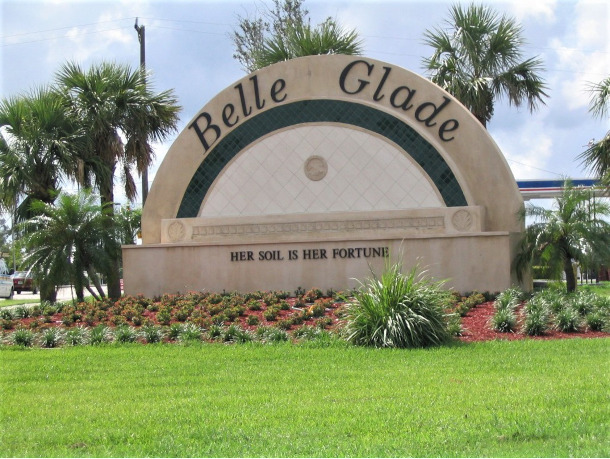
Belle Glade is one of three Florida cities collectively referred to as “Muck City.” (Photo: Blueeagle55, Wikimedia Commons, CC BY-SA 4.0)
TOLAN: So Kina Phillips, working with the former mayor of South Bay, called in the Sierra Club. The Stop the Burn Campaign was born.
PHILLIPS: We came on board and refused to be quiet about it.
TOLAN: Then their colleague Robert Mitchell formed the Muck City chapter of Black Lives Matter. Ms. Phillips says, this is an environmental justice issue.
PHILLIPS: It's racism.
TOLAN: Soon after, they called on Colin Walkes, then the mayor of Pahokee.
WALKES: The Glades welcome my family from the island of Barbados. I migrated here in 1982 with my mom, dad, sister, and brothers
TOLAN: Colin Walkes sits in a city park in Pahokee, the waves of Lake Okeechobee lapping the shore. He was 10 years old when his family moved to Muck City. After Pahokee High, Colin Walkes moved away for a while. Joined the army. Got his bachelor's in criminal justice. Became a probation officer. And then about 12 years ago, he came back with his own family.
WALKES: One of the reasons I got involved, too: I have a young son that is asthmatic. And since he's been here, he's had about maybe eight or nine asthma attacks. it happens during the Christmas break, you know, during Thanksgiving.
TOLAN: In other words, when the burns were going on. He began to worry about those burns. Then he ran for mayor of Pahokee, and won. He met with Kina Phillips and joined the Stop the Burn campaign.
WALKES: When I was in office, of course, I spoke out against the industry and I don't really call it speaking out. I called it an ask, to basically stop the practice of sugar cane burning.
TOLAN: And adopt safer, cleaner green sugar harvesting, with no burning. In Brazil and Australia, studies indicate green harvesting reduces soil erosion and conserves water. But Mayor Walkes soon realized he, and Kina Phillips, and a handful of other activists, were in a pretty small minority. And that had consequences.
WALKES: Speaking out against our industry as far as the practice of sugar cane burning is kind of like a death sentence here in the community when it comes to your livelihood.
TOLAN: When Colin Walkes ran for re-election, he lost. And then he lost a lot more.
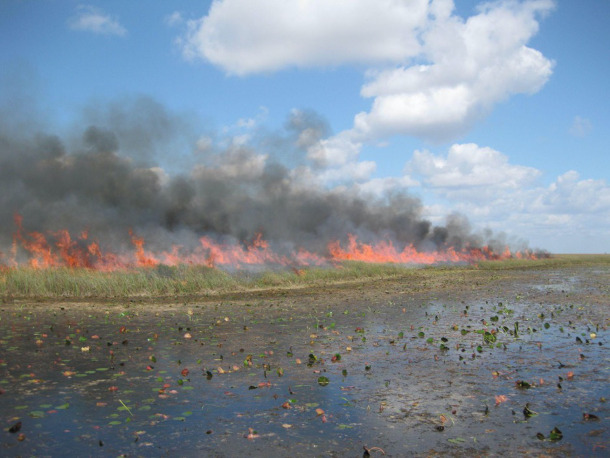
Sugarcane burning near the Florida Everglades. Advocates worry that burning sugarcane poses health hazards. (Photo: Florida Fish and Wildlife, Flickr, CC BY-ND 2.0)
WALKES: The most extreme thing that happened to me was happened in 2021 where I was actually fired from my job.
TOLAN: It was his fulltime job in community engagement, for a local nonprofit. When he engaged citizens on public health and sugarcane burning, he said powerful people complained, and he was out.
WALKES: And it really rocked me. You know, you have a daughter in college, you know, two young sons in the home, a wife. You got a mortgage, car notes and all these type things. I actually lost my home, you know?
[WAVES SFX]
WALKES: You have kinds, you know, my boys, oh. "We've got track meets coming up, Dad, or we got this with the band, you know, we got this with robotics." So, it's a tough situation to be in when you have to tell your kid, well, uh, uh, not going to be able to make the meet, not going to be able to make the meet because of basics like gas. You can see the disappointment in your kid's face. "Aw, Dad, man, I thought you was gonna make it to it."
[WAVES SFX]
WALKES: For about a month, we were actually homeless. I actually slept in the park for two nights, here in Pahokee, yeah. We lived in the in the homeless shelter for about a week, a week and a half. You know, my kids were staying with my mom, you know, but we were in the homeless shelter.
TOLAN: The former mayor had to think fast: He put the family savings into a gigantic charcoal smoker and food trailer.
WALKES: This is the firebox…
TOLAN: Now, Coal Brothers Cuisine began showing up at little league and high school football games on the weekends.
WALKES: ...and this is all indirect heating...
[FOOD SIZZLING SFX]
TOLAN: And Colin Walkes kept speaking out against the burns. The campaign wants this year to be the last burn season.
[FOOD SIZZLING SFX]
TOLAN: And so how unsafe are the burns, really? You hear a lot of stories about asthma attacks, more nebulizers in use, strange rashes, even people moving away entirely to get out from under the Black Snow. There's a whole lot of anecdotal evidence of health problems, and not just from the Stop the Burn folks. There's not much official interest in Muck City for in-depth health investigations. Internal studies by the Palm Beach county health department did link cane burning to toxic pollution and potential respiratory and carcinogenic effects. That's according to an investigation by Pro Publica and the Palm Beach Post. Publicly, though, a state official said there was no such proven link. And the many pro-sugar people here say critics are hyping the dangers without enough evidence.
JACKSON MOORE: I'm Tammy Jackson Moore. I've been in the Glades about 30 years, raised my children here.
TOLAN: Ms. Jackson Moore is co-founder of Guardians of the Glades, a community group aligned with the big sugar companies. She says the ash doesn't rain down every day during the burning reason, and when it does --
JACKSON MOORE: I get up and I sweep my porch and I go on about my day. I have never had an asthma attack since I moved here to this community. But I had terrible asthma when I lived in Jacksonville. Do people have asthma in our community? Absolutely. Can we equate their asthma to sugar cane burning? I don't think so. I'm not a doctor. I'm not a scientist. I don't think it's equated. There may be something that helps to trigger their asthma during the during the burning season, but that something could be what's growing here. It could be some of the flowers, it could be anything. But to say that it is because of sugar cane burning, and lay it all on sugar cane burning, I think that's unfair.
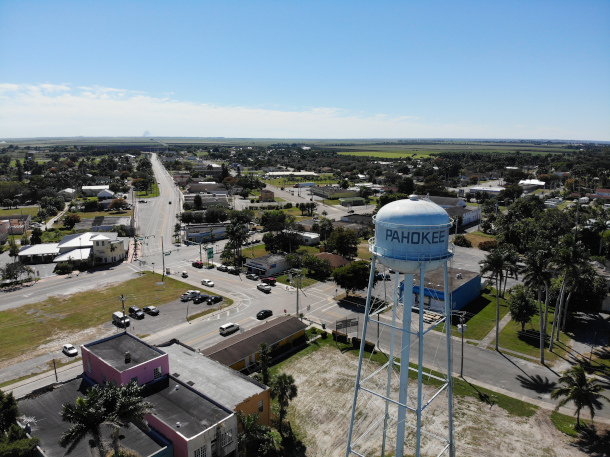
Pahokee Florida is part of what is colloquially known as “Muck City” and is often subject to the impacts of burning sugarcane. (Photo: Yanjipy, Wikimedia Commons, CC BY-SA 4.0)
TOLAN: You may be wondering what Big Sugar is saying. To me? Very little. I called, texted, emailed dozens of times. Finally, someone called back saying: we're not going to meet with you. A PR person for the Fanjuls' Florida Crystals wrote to say that because of previous stories they called unfair and inaccurate, they'd agree to an interview only if it were live on the air and unedited. Which rules out this and just about any other radio program or podcast, so, kind of unrealistic. Florida Crystals did send a statement signed by their vice president. He spent three pages describing their charitable work in education, sponsoring the Muck City Hall of Fame, providing sugar and rice during Covid and other efforts. About the burns, this, read by my colleague:
VOICE 11: Pre-harvest sugarcane prescribed burns are closely regulated and permitted on a daily, field-by-field basis by Florida Forest Service. Before authorizing or denying a permit, the state agency uses state-of-the-art computer modeling with real-time information about atmospheric and meteorological conditions. Air quality monitoring and data show that the area where sugarcane is farmed has some of the best air quality in the State of Florida – better than the state average, year after year.
TOLAN: Just to note: we did edit the company's statement. Reading it out loud, at a normal pace, it took me 13 minutes - almost as long as this entire story. But, what about that air quality claim? Is the air quality around the cane and in Muck City actually better than the rest of Florida? Well...
FERGUSON: To begin with, we know that the amount of particulate matter pollution produced annually by pre harvest sugar field burning during the harvesting season is roughly equivalent to the amount of particulate matter pollution produced by automobile vehicles throughout the state of Florida per year.
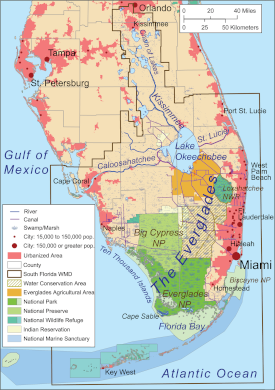
A map of the Everglades. Much of the sugarcane burning activity occurs in the Everglades Agricultural Area, which is highlighted in gold. (Image: Kmusser. Wikimedia Commons, CC BY-SA 3.0)
TOLAN: That's the Sierra Club's Patrick Ferguson, an organizer and attorney who set up shop in a storefront in Belle Glade, to work with Kina Phillips, Colin Walkes and other local campaign leaders. He points to studies in peer-reviewed journals linking cane burning to high concentrations of particulate matter, and to release of carcinogenic chemicals like benzene and formaldehyde. Bottom line, Ferguson says:
FERGUSON: The issue of sugar cane burning is a serious public health problem.
TOLAN: In late 2021 a joint study by Stanford University and NPR found that some of the worst air in the U.S. is in Florida's sugarcane plantations. So, wait: How could the area have both the cleanest air in the state and the worst air in the country? Some say it all comes down to air quality monitors: where they're located, how often they sample, and simply, how many there are.
FERGUSON: The federal air quality monitors that are used to determine compliance with national ambient air quality standards are generally determined by population densities.
TOLAN: And since there just aren't that many people in the Glades: far fewer monitors. So, reporters for ProPublica and the Palm Beach Post set up their own air sensors to register particulate matter, and documented big spikes in pollution during the burns - spikes that the other monitors seemed to miss, says Patrick Ferguson.
FERGUSON: And on days when there were spikes of particulate matter pollution it was when sugar cane burning was blowing in the directions of some of these monitors.
TOLAN: Now. Big Sugar disputes this. The companies accused Pro Publica of "selectively presenting their preferred interpretation" in support of a "biased conclusion,” even suggested they were collaborating with environmental activists - charges the journalists refuted.
NEWS REPORT: A new study raises some troubling concerns about the air quality in western Palm Beach County. CBS 12's Al Pefley says the study looked at the results of sugarcane burning...
TOLAN: But then, late last summer, a peer-reviewed study said particulate matter from the burns contributed to between two and three additional deaths per year across South Florida. It made the evening news.
NEWS REPORTER 2: Researchers from Florida State University looked at information from an atmospheric dispersion model... (dips under)
TOLAN: In the Glades, U.S. Sugar issued a statement.
NEWS REPORTER 3: …saying the FSU study is based on estimates and conjecture, and the statement says, quote, "shame on Florida State University for having its good name associated with such shoddy work."
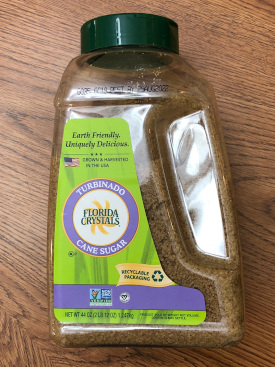
Florida Crystals is one of the sugar companies burning sugarcane in the Everglades area. (Photo: Famartin on Wikimedia Commons, CC BY-SA 4.0)
[BURNING SFX]
TOLAN: But, no matter how good the air really is, no matter how harmful the ash and smoke, there's one question the pro-sugar folks could never seem to answer.
[BURNING SFX]
TOLAN: Why do state officials allow the burns, when the ash falls on communities of color Muck City. And yet, they ban the burns when the wind blows east, toward majority-white communities: the stables and equestrian riding clubs of Wellington, and the Fanjul mansions in Palm Beach?
TOLAN: Sounds hard to believe, right? But documents from a public records request to the Florida Department of Agriculture show: it's a fact. I wanted someone from the sugar industry willing to face my microphone. For a long time, I couldn't find anyone.
REV. REASE: Let us stand and greet everyone, look around...
TOLAN: And then one day, of all places, - in church, I found him.
REV. REASE: God bless you. It's so good to see everyone here this morning
TOLAN: I've come to talk to Rev. Robert Rease, a pro-sugar pastor.
REV. REASE: …Come up and greet the congregation...(dips under)
TOLAN: But, surprise, here in the Lord's house, there's State Rep Rick Roth -- a politician and a sugar grower,
ROTH: Morning, everyone. It's a good day to be in the house of the Lord. Praise God.
TOLAN: He's hawking votes two days before the election…
ROTH: My heart is in the Glades. I've got muck underneath my toes. Thank God I am here today. We need people that fear God to run for public office. Please, I'm asking for your vote...
TOLAN: Now, Rick Roth slips out the back door. And a little rudely, I suppose, so do I.
[DOOR CLICKING, WALKING SFX]
TOLAN: Representative Roth? Representative Roth?...
[WALKING SFX]
TOLAN: He's a bit surprised to see me. But he agrees to talk - and he insists, there's nothing dangerous in the ash.
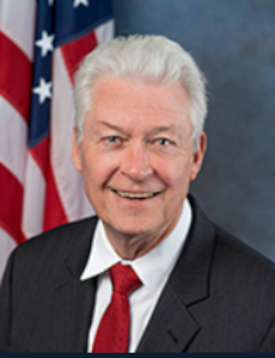
Florida state representative Rick Roth claims that burning sugarcane is safe. (Photo: Florida House of Representatives, MyFloridaHouse.gov, Public Domain)
ROTH: Well, it's funny. We've been doing cane burning ever since the industry really got going in the early 1960s. We have air quality monitoring. We have regulations. Burning is not dangerous to your health unless you're standing out in it and trying to breathe it. It's not an air quality issue. I don’t think it’s a health issue.
TOLAN: I want to ask you one more question…
TOLAN: This burning question: If everything is so safe, why let the Black Snow fall on Muck City, but then, when the wind blows east, toward those wealthier communities, pull the permits?
TOLAN: And a lot of people in Belle Glade feel like that's not fair.
ROTH: The cities had nothing to do with that. This is a Florida regulation.
TOLAN: But what do you think about that? I mean, they’re like…
ROTH: Well, the issue is you always have to make decisions. This is not a hazard. It is obviously an agenda.
TOLAN: But why would why...
ROTH: I’m saying it's an agenda, It's not an issue.
TOLAN: No, but I'm asking you, what about when the wind shifts and they pull the permits?
ROTH: (Pause) The, the regulations are done to do the least amount of harm possible. There is no data, no scientific data, to my knowledge. But you've asked four questions on this issue. Like it's as important as the economy, and it's not.
GOSPEL SINGER: Jesus loves the little children...all the children of the world. Red, yellow, black and white, they're all precious in his sight...
[MARCHING BAND SFX]
TOLAN: In Muck City, right up there with church, is football. This place has produced some 60 NFL players over the years. And no event pulls together the community - sugar boosters and burn critics alike - than the annual Muck Bowl game between Belle Glade and Pahokee high schools. It's Florida's ‘Friday Night Lights’ - and it's where I find Belle Glade Mayor Steve Wilson, just before kickoff.
MAYOR WILSON: We support our industry 100%. We make that clear with everybody.
TOLAN: Mayor Wilson gets pretty annoyed when he talks about the stop the burn campaign.
MAYOR WILSON: I've been here practically all my life. I was born in the city of Belle Glade. I have grandkids here. My kids are here. Do you really believe that I will expose my kids to an environment that's going to really be hazardous, to kill them? I have to be crazy. I love my family more than anything in this world. So all the critics and the naysayers, those folks who always got something to say, you know what? It's a part of life. We move on.
[FOOTBALL GAME SFX]
ANNOUNCER: We do want to make sure we give recognition to Florida Crystal. Let's give it up to all of our large donors…
CHEERLEADERS: BE! AGRESSIVE! B-E A-G-G-R-E-S-S-I-V-E! BE! AGRESSIVE...
[FOOTBALL GAME SFX, CHEERING SFX]
TOLAN: Just before halftime, I find the former mayor of Pahokee, and now-barbecue maestro, Colin Walkes. Today, his alma mater is already ahead by three touchdowns, and the former Pahokee high linebacker is serving up ribs.
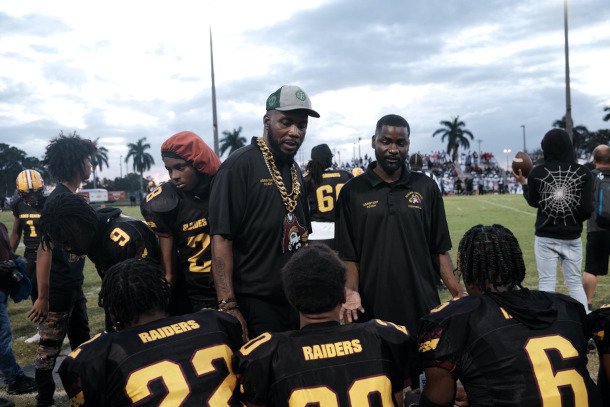
The coach for Glades Central talks to his players. The annual Muck Bowl game between Belle Glade and Pahokee high schools is a beloved community event. (Photo: Courtesy of Jose Jesus Zaragoza)
WALKES: Nothing ever replaces the experience of the mock bowl, you never forget it's like it's constantly playing in your head...you know I can visualize my last mock bowl from 1991. You know, you replay it in your head, all the tackles, all the plays.
TOLAN: Unlike Mayor Wilson, Mayor Walkes took on the sugar companies. After losing two jobs, losing his home, he had to reinvent himself with his Coal Brothers smoked meat.
WALKES: And my love and passion for cooking come from my mom and dad, you know, again, from Barbados, so my food has a kind of Caribbean taste to it
TOLAN: I get chicken on a stick. Tasty and a little bit sweet. Colin Walkes says, it's all good.
WALKES: Never in a million years would I thought I would have been in a situation like that. It cost me a lot. But we're rebuilding and I thank God for his grace and mercy once again, you know, for a sound mind and spirit and soul and a clean heart, you know, that you can rebuild. This is a story of redemption, you know? Yeah. Because I'm happy. Yeah, I'm happy, so...
[CHEERING SFX]
TOLAN: And one thing that would make him even happier: If this year, out on those hundreds of thousands of cane fields, it's the very last season of the burning.
[CHEERING, APPLAUSE SFX]
TOLAN: For Living on Earth, this is Sandy Tolan, in Palm Beach County, Florida.
VOICE 12: That's what we do! That's what we do!
[CHEERING, APPLAUSE SFX FADES]
CURWOOD: Support for Sandy’s story came from the Pulitzer Center for Crisis Reporting.
Related links:
- Watch Friends of the Everglades’ video series The Last Burn Season here
- Click here to read Pro Publica’s work on sugarcane burning in Florida
- See how sugarcane burns color Belle Glade’s landscape on NASA’s Earth Observatory
- Miami Herald | “Florida’s Sugar Harvest Sends Fields Up in Smoke. Some Residents Are Literally Sick of It.”
- Visit Sandy Tolan’s Website
[MUSIC: Habib Koite & Bamada, “Foro Bana” on Ma Ya, by Habib Koite/arr. Habib Koite & Bamada, Putumayo Artists]
BASCOMB: Coming up – the tragedy of the War in Ukraine reaches under the sea to Dolphins and porpoises. That’s just ahead on Living on Earth.
ANNOUNCER: Funding for Living on Earth comes from you, our listeners, and United Technologies, combining passion for science with engineering to create solutions designed for sustainability in aerospace, building industries, and food refrigeration.
[CUTAWAY MUSIC: Nashville Mandolin Ensemble, “Music for a Found Harmonium” on Plectrasonics, by Simon Jeffes, CMH Records]
Beyond The Headlines

A study published in the international Journal of Environmental Research and Public Health estimated that gas-burning stoves are responsible for 12.7 percent of childhood asthma in the United States. (Photo: Kevin Spencer, Flickr, CC BY-NC 2.0)
BASCOMB: It’s Living on Earth, I’m Bobby Bascomb.
CURWOOD: And I’m Steve Curwood
And on the line now from Atlanta, Georgia is living on Earth contributor Peter Dykstra. Hey, Peter, what do you have for us this week? There from Atlanta.
DYKSTRA: Hi, Steve, what we're going to treat you with an all Washington segment. Yes, there's stuff going on in Washington. The nation's premier consumer watchdog agency is the Consumer Product Safety Commission. And one of its commissioners, Richard Trumka, Jr. suggested that we should consider moving away from gas cooking stoves. There are so many things that have been cited in so many studies in recent years indoor air pollution, major cause of asthma, the production of soot, the production of other toxic chemicals. And of course, those gas stoves are a contributor to climate change.
CURWOOD: And how did Washington respond to this news? And because, in fact, it's true that gas stoves are not so healthy for us.
DYKSTRA: Well, the Republican Party and the oil and gas industry felt mighty threatened by the notion of banning gas stoves, except the fact that no one in the Biden administration nor Commissioner Trumka suggested that anyone was banning gas stoves, the Consumer Product Safety Commission police are not going to come in, in the dark of night and unhook your gas stove and haul it away. Trumka suggested that there possibly would be no gas hookups built into new homes. There are some places like Berkeley, California that have already made this law, New York State is considering the same thing. The CPSC is actually going to study this later in the year. But nobody, nobody said that gas stoves should be banned, and the one you may have now should be shut down.
CURWOOD: And if you do have one right now, and you're concerned about your health, just use that overhead hood to exhaust the fumes or open a window.
DYKSTRA: A partial but easy fix.
CURWOOD: Hey, what else do you have for us?
DYKSTRA: Well, we're looking at the new Republican Chair of the House Science Committee, Representative Frank Lucas, Republican of Oklahoma, he acknowledges that climate change is real, in part because the farmers in his Oklahoma district keep telling him how things are changing. More intense storms, more intense droughts, heat waves, his Republican predecessor up until 2019, Texas Congressman, Lamar Smith was a hardcore denier.
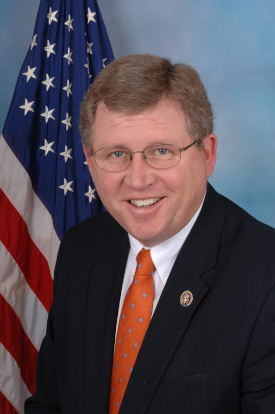
Frank Lucas is a representative of Oklahoma and was named the Chairman of the House of Science Committee on January 10, 2023. (Photo: U.S. Congress, Wikimedia Commons, Public Domain)
CURWOOD: But what does he say about the oil and gas industry that's so important there in Oklahoma?
DYKSTRA: Well, the gas industry from the perspective of just about every member of Congress in a state like Oklahoma needs protecting his policies and speeches have shown a strong need to protect, it's not certain that he's going to do anything to follow through on his own acknowledgments, that climate change is real. Oklahoma, don't forget to in addition to farming, and oil and gas is a place where the wind comes roaring down the plane. And wind power has actually become a big deal there as well.
CURWOOD: Yeah, they're in the transition right next to all those wind farms across the border there in Texas. Okay, well, let's take a look back in history now, Peter.
DYKSTRA: On January 22 1970, in his State of the Union address, Richard Nixon said this.
NIXON: Restoring nature to its natural state is a cause beyond party and beyond factions. It has become a common cause of all the people of this country.
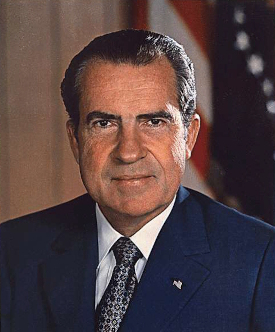
US President Richard Nixon discussed his initiatives regarding protecting the environment during his State of the Union address on January 22, 1970. (Photo: Rupert Colley, Flickr, CC BY 2.0)
DYKSTRA: Well, imagine that a bipartisan approach to environmentalism. Nixon, of course, was a pioneer in many ways on the environment. During his watch,
CURWOOD: Yeah, he created the Environmental Protection Agency for one thing.
DYKSTRA: Yeah, the Clean Air Act was signed by Nixon, the Endangered Species Act, the Marine Mammal Protection Act, the National Environmental Policy Act, and not only did he say environmental things, those things are evidence that he followed through on many of them.
CURWOOD: Well, there's a lot to not like about Richard Nixon. But when it comes to environmental action, apparently, there's a lot to like.
DYKSTRA: He was not a crook on environmental issues, as far as we know.
CURWOOD: Well thanks, Peter. Peter Dykstra is a regular contributor to Living on Earth. And we'll talk to you again real soon.
DYKSTRA: All right, Steve, thanks a lot. Talk to you soon.
CURWOOD: And there's more on these stories on the living on Earth webpage. That's loe dot org.
Related links:
- Learn more about Childhood Asthma and Gas Stoves in the United States
- New York Times | “Ban Gas Stoves? Just the Idea Gets Some in Washington Boiling.”
- Union of Concerned Scientists | “Should New Gas Stoves Be Banned?”
- E&E News | “Meet the New GOP Chair of the House Science Committee”
- Read Richard Nixon’s 1970 Annual Message to the Congress on the State of the Union
- Watch President Richard Nixon's Message to Congress on the Environment
[MUSIC: Oklahoma! Studio Orchestra/Jay Blackton, Overture from the original Oklahoma! soundtrack, by Richard Rodgers, Oscar Hammerstein II, Angel Records]
Marine Mammal Casualties of Russia’s War
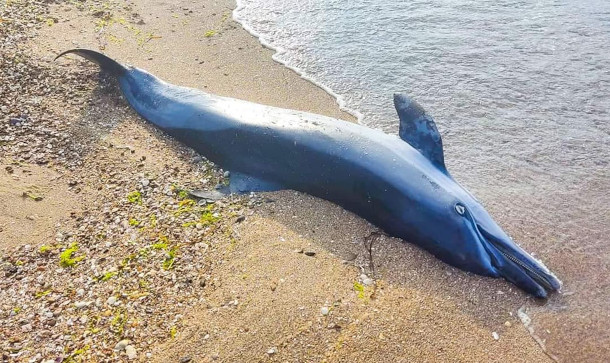
The recent rise in cetacean deaths in the Black Sea is likely due to acoustic trauma from military sonar, scientists say. (Photo: Ivan Rusev)
BASCOMB: It’s been almost a year since Russia first invaded Ukraine and the Black Sea remains a critical theater of the war. The Crimean Peninsula, annexed from Ukraine in 2014, is home to Russia’s Black Sea fleet, which uses the area as a base from which to launch missiles and send its submarines to patrol the waters. Some say hundreds of thousands of people have died as a result of the war, and marine mammals are another unspoken casualty. Mass stranding’s of cetaceans, or dolphins, whales, and porpoises, are often linked to the use of military sonar, which disorients animals that use sound to navigate. So, many marine scientists working in the Black Sea are looking to sonar as the likely culprit for some 2,000 marine mammals that have washed up dead since the war began. Scientists assume many more died further from the shore and sank undetected, a suspicion they can’t confirm since the Black Sea is an active war zone. Alix Kroeger is a freelance journalist from the UK. She spoke with researchers in the region about the impacts of war on cetaceans. Alix, welcome to Living on Earth!
KROEGER: Thank you.
BASCOMB: So it sounds like the Black Sea has really become a war zone. And many of the cetaceans that live there have become a casualty of that war. Can you tell us about that, please?
KROEGER: That's right. So in the Black Sea, you have very significant populations of cetaceans, and they seem to have been quite badly affected by all this unusual movement in the Black Sea. I spoke to a conservationist from Romania, who said that the number of dead cetaceans washing up on the Romanian portion of the of the coast had nearly doubled between January and May. So in 2021, they had fewer than 100 washing up dead. In 2022, they had 194. What's changed? It's the war in Ukraine. There has been a lot of disturbance. If you think of helicopter noise over the Black Sea, submarines using sonar to get through, all the unusual movement there's been, that has really disturbed some of the marine life. For example, it's driven more porpoises and dolphins towards the Bulgarian portion of the coast because they've just been displaced by all this unusual activity.
BASCOMB: Well, displacement is one thing, washing up dead is another. What is actually causing them to die in this way?
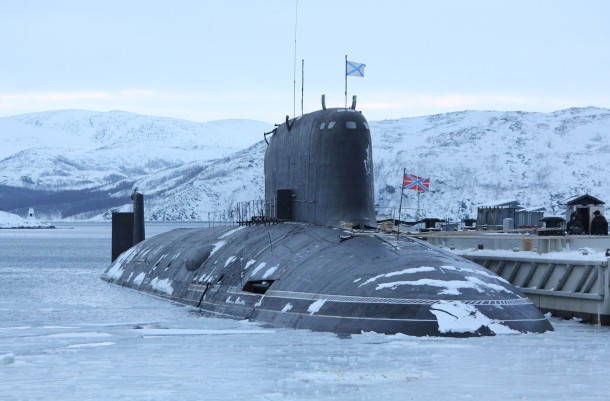
Military sonar from submarines and other vessels can damage cetaceans’ inner ears, interfering with the animals’ ability to navigate. This may make it impossible to find food or avoid shallow waters. (Photo: Ministry of Defense of the Russian Federation, Wikimedia Commons, CC BY 4.0)
KROEGER: Well, the scientists suspect that it is the use of sonar by military submarines. And that disturbs the dolphins and porpoises because that's how they navigate. That's also how they find food. They use their own sonar, these whistles and beeps and clicks to get through the sea. But this very powerful sonar that the submarines are using, it damages the animals’ inner ears. They are thrown off course, they can be washed up on shore, they get into shallower waters, waters that they're not used to, maybe where they can't get as much food as they used to. And they can't get themselves back out again. The problem is because it's military, there's a high degree of secrecy attached. Navies don't particularly want to give all the details of how their sonar operates. Because that could give an advantage to any future opponents. So it's difficult for the scientists to get the exact details on what's going on, and how that affects marine life.
BASCOMB: So it sounds like you know, if you had a hawk, for instance, that was blind and still expecting it to be able to navigate the world and feed itself. It's a similar situation here for cetaceans, with this, you know, damage to their ears.
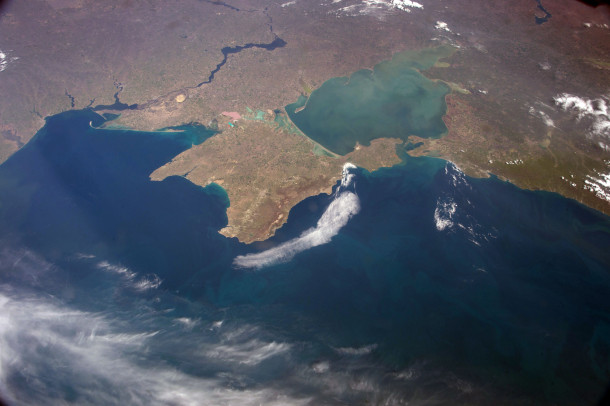
The Crimean Peninsula, annexed from Ukraine in 2014, is now home to the Russian Black Sea fleet, which includes vessels that use powerful sonar. (Photo: Stuart Rankin, Flickr, CC BY-NC 2.0)
KROEGER: I think that's right, yeah, they just can't function in the way that they normally did. And, you know, the Black Sea, if you look at it on a map, it almost looks like an inland lake. So there's relatively little water coming in or out. One of the peculiarities of the Black Sea is that it's actually anoxic. It's dead below I think about 150 meters, so any pollutants can stay for a long time. And if you think of the military activity, sonar may be disturbing dolphins and porpoises in particular, but there's also things like undersea explosions. If submarines are firing missiles, there's pollution. If some of those missiles are shot down, if those then fall into the Black Sea, that causes pollution. And of course, if you think of that massive Russian warship, the Moskva, that was sunk off Snake Island, everything that was in that is now resting on the seabed, and potentially causing damage to the ecosystem.
BASCOMB: So now that we know this is such an issue for cetaceans in the Black Sea, what can be done about it? What are local conservation organizations and governments suggesting here?
KROEGER: Well, the reason I got interested in this story in the first place was reading about a Ukrainian scientist who works in a national park on the Black Sea coast, and he was talking to his colleagues all around the Black Sea, and totting up unusual numbers of dead cetaceans and raising the alarm. He came up with this idea for a protected area, just off the coast. And he's got the Ukrainian Ministry of Environment interested in investigating this, because at the moment, there are very few areas where injured dolphins or porpoises can recover. There are marine protected areas designated under international law around the Black Sea. But the problem is enforcement. There is illegal fishing that goes on. And while there have been efforts to crack down on bycatch, porpoises and dolphins getting caught in fishing gear and dying that way, if the fishing itself is illegal, it's very difficult to control that. What was interesting, I spoke to you know, these conservationists in Turkey, Romania, Bulgaria and Ukraine. They all know each other. They all work together, they go to the same conferences, they share data. So they are working really hard, and they are pooling their resources. The problem is with the war, it's just too difficult to do much research, to get out to sea, you can imagine. And so these datasets that they have spent years building up, they are going to have unavoidable gaps in them. And I think that is really difficult for science. But what is more promising is the way that some conservationists, the Ministry of Environment in Ukraine, they're looking to beyond the war, what happens next? And trying to think of a plan and, okay, how can we do this better in future? So yes, it looks pretty bad at the moment. But they are trying to preserve some optimism at least.
BASCOMB: I mean, we all want to stay optimistic, of course. But in times of war, everything becomes difficult. And you need all of these many countries that you mentioned earlier to coordinate and to work together towards this goal. And, you know, I think it's safe to say that Russia, you know, isn't exactly respecting civilian life in times of war. So what hope is there do you think of them respecting these marine mammals and working towards this goal of conservation?
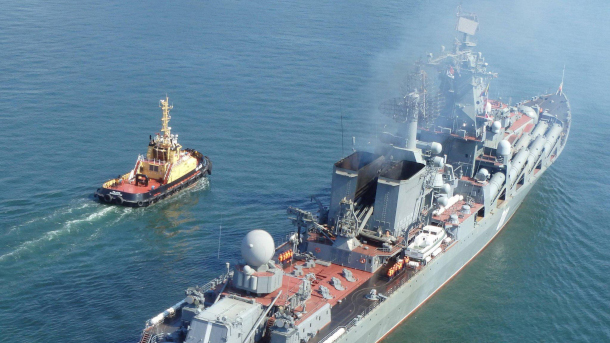
Remnants of the sunken Russian warship Moskva also expose the Black Sea’s marine life to dangerous pollutants. (Photo: mannhai, Flickr, CC BY 2.0)
KROEGER: I think that's a very valid question. And the answer is probably not particularly edifying. Certainly, the Russian military has not shown a great respect for the life of its own soldiers. We've heard these accounts of conscripts, newly mobilized soldiers, being thrown into what's described as a meat grinder on the Eastern Front. Russian casualties, human casualties have been very high. Would they respect marine life? I wouldn't want to place a lot of money on it. The scientists may be another matter. And before the war broke out, there was cooperation with scientists from Russia, with their counterparts in other countries. Who knows what it will look like afterwards, but I wouldn't get my hopes up. The priority will probably be on restoring the human population, rebuilding the cities. And after that, there will be more opportunity to look at what remains of the natural world, but that could be quite a long way off.
BASCOMB: Alix Kroeger is a freelance journalist. Alix, thank you so much for your time today.
KROEGER: Thanks very much for talking to me.
Related links:
- BBC Future | “How the War in Ukraine Is Killing Marine Mammals”
- About Tuzly Estuaries National Park (Ukraine)
- About Mare Nostrum (Romania), which has documented a high number of strandings since the war began
- NOAA Fisheries | “Dolphins and Porpoises”
- NOAA Fisheries | “Beaked Whale Strandings in the Mariana Archipelago May Be Associated with Sonar”
[SFX DOLPHIN SOUNDS]
Listening on Earth: Dolphins Talk
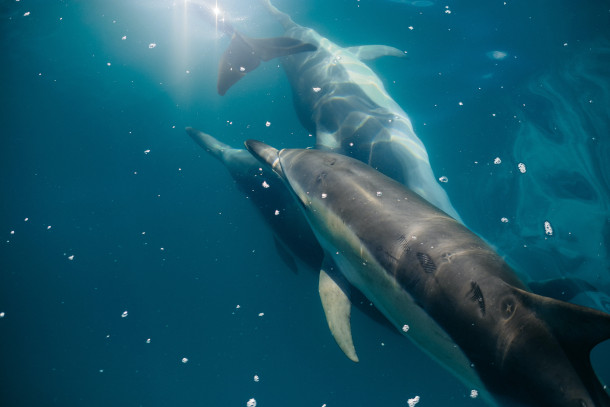
Dolphins swim in a pod off the coast of Kaikoura, New Zealand. (Photo: Pablo Heimplatz, Unsplash)
BASCOMB: Bottlenose dolphins live in temperate and tropical waters worldwide, including the Black Sea.
[DOLPHIN SOUNDS]
BASCOMB: To echolocate and navigate the world around them they send out a series of rapid clicks, each roughly 100 microseconds long.
[DOLPHIN SOUNDS]
BASCOMB: They also use whistles to communicate with other dolphins. Each individual has its own signature whistle, sort of a name within the pod. Mother dolphins whistle almost continuously to newborn calves to imprint their name upon them. These Bottlenose Dolphins were recorded in the Bahamas by Wild Quest.
[DOLPHIN SOUNDS]
Related link:
Wild Quest’s website
[MUSIC: RiME, “The Song of the Sea (Instrumental)” https://www.youtube.com/watch?v=5-QDlXjg4yw]
CURWOOD: Living on Earth is produced by the World Media Foundation.
Our crew includes Fern Alling, Naomi Arenberg, Paloma Beltran, Iris Chen, Josh Croom, Jenni Doering, Mark Kausch, Mark Seth Lender, Don Lyman, Jusneel Mahal, Louis Mallison, Aynsley O’Neill, Sophia Pandelidis, Jake Rego, El Wilson, and Jolanda Omari.
BASCOMB: Tom Tiger engineered our show. Alison Lirish Dean composed our themes. You can hear us anytime at L-O-E dot org, Apple Podcasts and Google Podcasts, and like us, please, on our Facebook page - Living on Earth. We tweet from @livingonearth. And find us on Instagram at livingonearthradio. I’m Bobby Bascomb.
CURWOOD: And I’m Steve Curwood. Thanks for listening!
ANNOUNCER: Funding for Living on Earth comes from you, our listeners, and from the University of Massachusetts, Boston, in association with its School for the Environment, developing the next generation of environmental leaders. And from the Grantham Foundation for the protection of the environment, supporting strategic communications and collaboration in solving the world’s most pressing environmental problems.
ANNOUNCER 2: PRX.
Living on Earth wants to hear from you!
Living on Earth
62 Calef Highway, Suite 212
Lee, NH 03861
Telephone: 617-287-4121
E-mail: comments@loe.org
Newsletter [Click here]
Donate to Living on Earth!
Living on Earth is an independent media program and relies entirely on contributions from listeners and institutions supporting public service. Please donate now to preserve an independent environmental voice.
NewsletterLiving on Earth offers a weekly delivery of the show's rundown to your mailbox. Sign up for our newsletter today!
 Sailors For The Sea: Be the change you want to sea.
Sailors For The Sea: Be the change you want to sea.
 The Grantham Foundation for the Protection of the Environment: Committed to protecting and improving the health of the global environment.
The Grantham Foundation for the Protection of the Environment: Committed to protecting and improving the health of the global environment.
 Contribute to Living on Earth and receive, as our gift to you, an archival print of one of Mark Seth Lender's extraordinary wildlife photographs. Follow the link to see Mark's current collection of photographs.
Contribute to Living on Earth and receive, as our gift to you, an archival print of one of Mark Seth Lender's extraordinary wildlife photographs. Follow the link to see Mark's current collection of photographs.
 Buy a signed copy of Mark Seth Lender's book Smeagull the Seagull & support Living on Earth
Buy a signed copy of Mark Seth Lender's book Smeagull the Seagull & support Living on Earth

